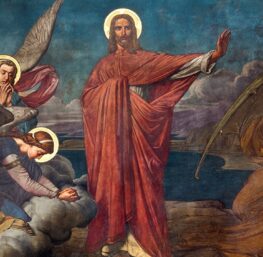From Wesley Smith:
I participated in an on-line debate for Court TV yesterday with Florida bioethicist, Bill Allen. We mostly discussed Terri Schiavo. But we also got deeper into the context in which the Schiavo case is being played out, that is, the idea that some of us are not “persons” based on cognitive impairments. Note, that Dr. Allen agrees with my worry, that personhood theory would not only permit Terri to be dehydrated, but harvested for organs, assuming consent. To say the least, this undermines universal human rights. Here is an excerpt. The entire debate can be found here.
Wesley Smith: Bill, do you think Terri is a person?
Bill Allen: No, I do not. I think having awareness is an essential criterion for personhood. Even minimal awareness would support some criterion of personhood, but I don’t think complete absence of awareness does.
Wesley Smith: This is my big problem with modern bioethics thinking. Personhood theory is very dangerous. It says that being human in and of itself is not morally relevant. It means that some of us have lower worth than others of us. Indeed, there is some advocacy in bioethics of being allowed to do organ harvesting from people in PVS. THIS ISN’T HAPPENING, I STRESS. But it shows where personhood theory leads. Frankly, I see it as the end of universal human rights because it means that we are not all intrinsically equal.
Bill Allen: Well, Wesley, if awareness isn’t a defining criterion of personhood, then on what grounds or basis do you attribute personhood? What is a person without awareness?
Wesley Smith: I think being human in and of itself should be the relevant criterion. Under personhood theory, not only are people like Terri denigrated as non persons, but so too for some, are newborn infants, who are not self-aware. Peter Singer of Princeton comes to mind. If Terri is not a person, should her organs be procured with consent? And consent from Michael?
Bill Allen:…Yes, I think there should be consent to harvest her organs, just as we allow people to say what they want done with their assets.




“The Illness and Cure of the Soul in the Orthodox Tradition” by Metropolitan of Nafpaktos Hierotheos, is what I’ve been reading tonight. It’s been good material in regards to Terry’s case and what you mention above.
Why does our culture want to have a sliding scale for one’s “humanity” based upon their “reasoning” skills but not their “ethical” or “nous” skills?
Why are we trying to attach a persons rights to the degree that scale measures?
And what is this perversion of thought that claims ones humanity is achieved by a lack of suffering?
Our Lord suffered…but we think we should only hold onto life when we can avoid suffering! As Christians, do we believe we sleep in our Lord until the resurrection or that we die an eternal death?
What good are our prayers, in rememberance of the dead, when we act as if they are ineffective or unmoving to our Lord when our sick are still with us?
From the book:
“We, Orthodox, consider the nous as the basis of theology, whereas the Westerners put reason at the centre of their theology.”
“The Holy Fathers have an illumined nous, whereas the heretics usually have a darkned nous and a hypertrophic reason.”
speaking of the effects of the fall,”So we have nous’ identification with reason. The nous, instead of governing reason, is now identified with it.”
“if therefore the light that is in thee be darkness, how great is that darkness!” (Mat. 6:23)
“professing themselves to be wise, they became fools, and changed the glory of the incorruptible God into an image made like to corruptible man, and to birds, and four-footed beasts, and creeping things.” (Rom. 1:22-23)
Have we not also now corrupted our own created image and likeness of God into images of birds, beasts, and creeping things? If we embrace these current views on death and life, thinking we are wise for our compassion, I can’t see how we can hold onto the Churches teachings on man’s ontology and that of theosis. And by putting “reason” at the centre of our theology we become heretics.
No? If any can help me answer the questions I offered I would appreciate it.
Adam, you are perfectly correct, but I would go one step further, modern medical “ethics” not only identifies the person with reason, but with the physical body as well. Too much of modern medicine has become a fight against the mortality of the body that the failures must be “mercifully” put to death.
One thing we will never know is the suffering of Terri’s soul from her premature death. Her nous, her being was perceiving even when her brain may not have been capable. I know God will forgive her.
One thing Christianity clearly teaches is that suffering born with faith is salvific. Because of the fall, suffering is to be expected. As the Russians put it life is podvig, i.e., struggle. In fact, as our nous awakens to the life of the Holy Spirit, I assume both the level and the acceptance of suffering increase. Jesus suffered the most because He was fully aware and fully alive and innocent. When we deny suffering, we deny not only our full identity as fallen creatures of God, but also the path of salvation. The Way of Christ is the Way of the Cross–suffering inextricably bound with forgiveness which is the true justice.
So, we have tried to save the physical life of Terri Schiavo and failed, we must now suffer that failure in forgiveness for only then do we reclaim the humanity we are heir to by the grace of God. Remember, in Christ their is no death! Only the hardness of our hearts prevents us from knowing the life of God within the nous–the divine spark that is so far beyond reason as to make man’s reason foolish blasphemy.
There is no dignity in death, it is cruel and vicious on all levels, but it cannot be overcome with machines, technology, and the mind of man. It is only overcome by the life giving forgiveness of our Lord, God, and Savior, Jesus Christ.
Adam, the value of a person cannot rest in what he produces, but simply in the fact he is created by God. This is the great division between pro-death and pro-life forces that clash in issues like Terri Schiavo. This is why you have prominently secularists on one side, and religious believers on the other.
The secularists want to codify the value of life based on function. Some will deny this this, but their leading edge ethicists like Peter Singer are quite clear about it. If man is functionally a machine, you fix it when it breaks, and discard it when it becomes useless.
Suffering need not be salvific in this outlook, since there is nothing to be saved from. Better just to end suffering by ending the sufferer. Of course there are all sorts of ideas that inform this outlook that have not seen the light of day — yet. The death of Terri Schiavo may change this.
Further, Not all ethicists are secularists. In fact, some of the best ethicists are Christian. The arguments there are as great as they are in the culture and fall along the same fault lines, you just don’t hear about it much. Giving ethics committees full authority over life and death decisions however, would be foolish.
Yes, there is no dignity in death, yet people die a dignified death all the time. I’ve seen it. The great perversion of the pull-the-tube types is that they want to steal the term to describe euthanasia. They decide who dies, and when they die. They really believe, deep down, that man is no more than biological machine.